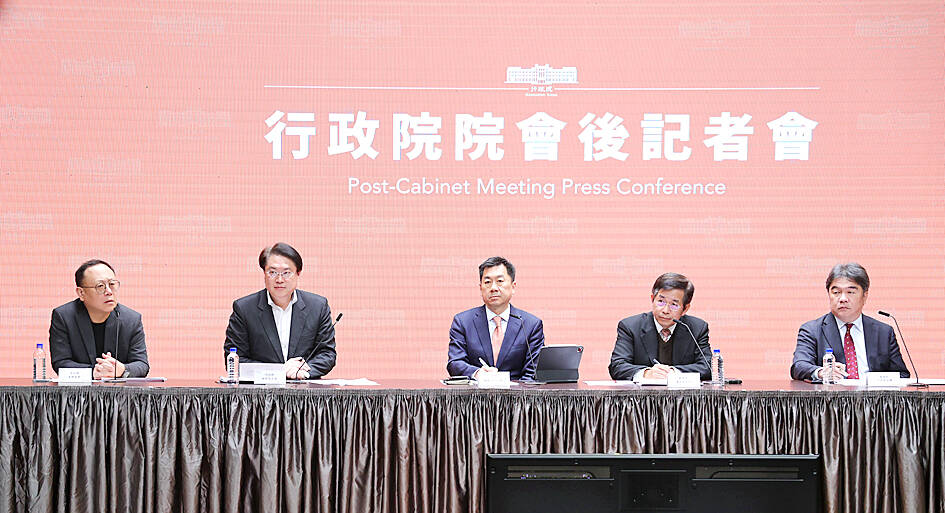The government yesterday announced mortgage and student loan subsidies to help ease financial challenges brought by the COVID-19 pandemic.
The Executive Yuan approved a Ministry of the Interior proposal to provide one-off mortgage subsidies of NT$30,000 (US$991) to eligible home buyers, Executive Yuan spokesman Chen Tsung-yen (陳宗彥) said.
Home buyers with an annual household income of less than NT$1.2 million who are liable for an original mortgage of up to NT$8.5 million in Taipei, or up to NT$7 million in the rest of the country, can apply for the subsidy, Chen Tseng-yen told reporters following a weekly Cabinet meeting presided over by Premier Chen Chien-jen (陳建仁).

Photo: CNA
Applications are to open on Feb. 28, the ministry said, adding that about 550,000 households are expected to benefit.
Owners of multiple homes would be excluded, it added.
Housing justice is high on the premier’s agenda, Chen Tsung-yen said, adding that the measure is part of a government effort to help offset fallout from the pandemic on low-income and middle-class households over the past three years, during which interest rates were raised four times.
The subsidy is not meant to encourage people to buy homes or to subsidize luxury homeowners, Minister of the Interior Lin Yu-chang (林右昌) said, adding that landlords would not receive the subsidy.
The Cabinet also approved a proposal seeking to grant rent subsidies for economically disadvantaged people, including students aged 18 or older, as part of an annual NT$30 billion program implemented last year.
The number of eligible applicants has increased from 60,000 to 277,000, Lin said.
About 40 percent of subsidy recipients are underprivileged households, while young adults and newly married couples account for 30 percent, Lin added.
Meanwhile, students and recent graduates in need of financial assistance would have one year of student loans forgiven, Minister of Education Pan Wen-chung (潘文忠) said.
The plan is expected to help 546,000 low-income students, recent graduates raising children and recent graduates earning less than NT$40,000 per month on average, Pan said, adding that it would be implemented in July.
About NT$380 billion in financial surplus and special budget funds are to go toward forgiving the loans, including principal and interest, he said.
No application would be necessary, with the forgiven amount deducted directly through issuing banks, Pan added.
The Ministry of Culture also announced NT$1,200 vouchers for young people who have missed out on “coming-of-age” traditions during the pandemic.
Originally intended only for 18-year-olds, the ministry has decided to issue the vouchers to Taiwanese aged 18 to 21, it said, adding that about 900,000 people would benefit.
Teenagers have not been able to hold graduation ceremonies or go on class trips over the three years of the pandemic, the culture ministry said.
The vouchers can be used for visiting exhibitions, performances or screenings of locally made movies, or to buy books, crafts or art, it said.
The plan is one of five programs proposed by the culture ministry to help young adults and revitalize Taiwan’s cultural industries, it said in a news release yesterday.
It also plans to support small bookstores, shops and cultural spaces; promote art classes and cultural experiences on and off campus; bring traditional performance troupes to rural areas; and expand art-related content to enhance cultural self-confidence, it said.

CHAOS: Iranians took to the streets playing celebratory music after reports of Khamenei’s death on Saturday, while mourners also gathered in Tehran yesterday Iranian Supreme Leader Ayatollah Ali Khamenei was killed in a major attack on Iran launched by Israel and the US, throwing the future of the Islamic republic into doubt and raising the risk of regional instability. Iranian state television and the state-run IRNA news agency announced the 86-year-old’s death early yesterday. US President Donald Trump said it gave Iranians their “greatest chance” to “take back” their country. The announcements came after a joint US and Israeli aerial bombardment that targeted Iranian military and governmental sites. Trump said the “heavy and pinpoint bombing” would continue through the week or as long

TRUST: The KMT said it respected the US’ timing and considerations, and hoped it would continue to honor its commitments to helping Taiwan bolster its defenses and deterrence US President Donald Trump is delaying a multibillion-dollar arms sale to Taiwan to ensure his visit to Beijing is successful, a New York Times report said. The weapons sales package has stalled in the US Department of State, the report said, citing US officials it did not identify. The White House has told agencies not to push forward ahead of Trump’s meeting with Chinese President Xi Jinping (習近平), it said. The two last month held a phone call to discuss trade and geopolitical flashpoints ahead of the summit. Xi raised the Taiwan issue and urged the US to handle arms sales to

State-run CPC Corp, Taiwan (CPC, 台灣中油) yesterday said that it had confirmed on Saturday night with its liquefied natural gas (LNG) and crude oil suppliers that shipments are proceeding as scheduled and that domestic supplies remain unaffected. The CPC yesterday announced the gasoline and diesel prices will rise by NT$0.2 and NT$0.4 per liter, respectively, starting Monday, citing Middle East tensions and blizzards in the eastern United States. CPC also iterated it has been reducing the proportion of crude oil imports from the Middle East and diversifying its supply sources in the past few years in response to geopolitical risks, expanding

Pro-democracy media tycoon Jimmy Lai’s (黎智英) fraud conviction and prison sentence were yesterday overturned by a Hong Kong court, in a surprise legal decision that comes soon after Lai was jailed for 20 years on a separate national security charge. Judges Jeremy Poon (潘兆初), Anthea Pang (彭寶琴) and Derek Pang (彭偉昌) said in the judgement that they allowed the appeal from Lai, and another defendant in the case, to proceed, as a lower court judge had “erred.” “The Court of Appeal gave them leave to appeal against their conviction, allowed their appeals, quashed the convictions and set aside the sentences,” the judges